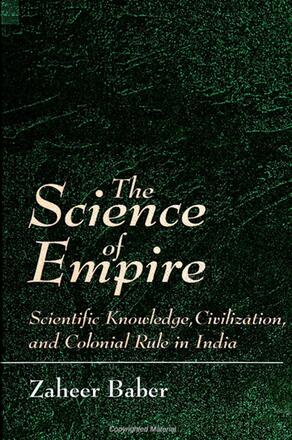
The Science of Empire
Scientific Knowledge, Civilization, and Colonial Rule in India
Alternative formats available from:
Investigates the complex social processes involved in the introduction and institutionalization of Western science in colonial India.
Description
In Science, Civilization, and Empire in India, Zaheer Baber analyzes the social context of the origins and development of science and technology in India from antiquity through colonialism to the modern period. The focus is on the two- way interaction between science and society: how specific social and cultural factors led to the emergence of specific scientific/technological knowledge systems and institutions that transformed the very social conditions that produced them. A key feature is the author's analysis of the role of pre-colonial trading circuits and other institutional factors in transmitting scientific and technological knowledge from India to other civilizational complexes. A significant portion represents an analysis of the role of modern science and technology in the consolidation of the British empire in India.
Zaheer Baber is Lecturer in the Department of Sociology at the National University of Singapore.
Reviews
"Baber surveys 2000 years of science in South Asia, concentrating on sociopolitical conditions behind institutional structures. He has a good grasp of the recent secondary literature, and he writes well. This will become a standard book in the burgeoning field of science and imperialism."— Lewis Pyenson, Université de Montréal
"This macro level study is certainly meritorious in itself, but importantly it provides an important link between studies of ancient and medieval India and contemporary India. As many universities are trying to introduce courses in the context of diversity, or studies of postcolonial societies, I think this study would be extremely useful for students to grasp the complexity and contradictions of colonial domination. This book can be fruitfully used for courses in sociology of science to complement the theoretical studies of western science and technology development. I feel that the paucity of books providing such a broad picture of science and technology in India would make it attractive to anyone interested in South Asian or science and technology in underdeveloped countries." — Shripad D. Deo, Colorado State University
"Baber provides a balanced and thoughtful account of the development of science and technology in India. He delineates the religious and practical impetuses for the development of science and technology in ancient and medieval India and the cultural influences that shaped its course and direction, for example, toward solar and calendric astronomy and away from a concentration on stellar navigation as in Europe. The book is extremely readable, well written, and contains fascinating examples." — Henry Etzkowitz, State University of New York, College at Purchase